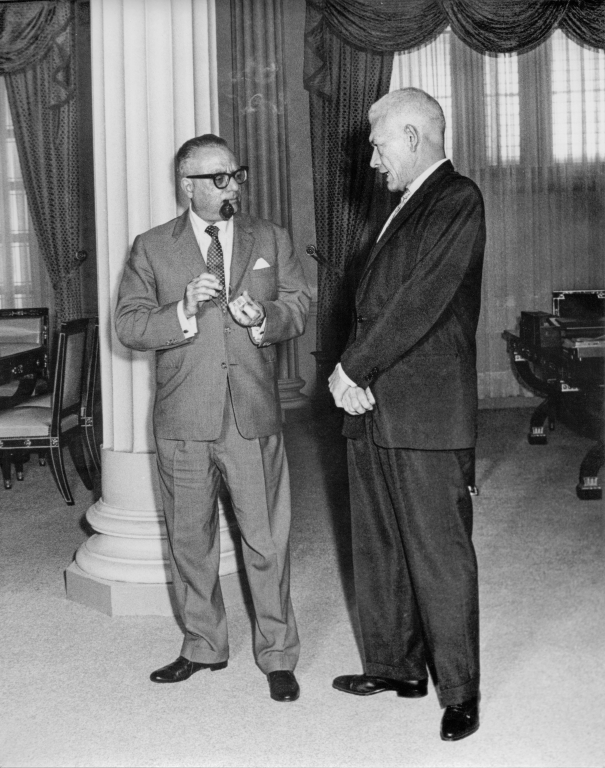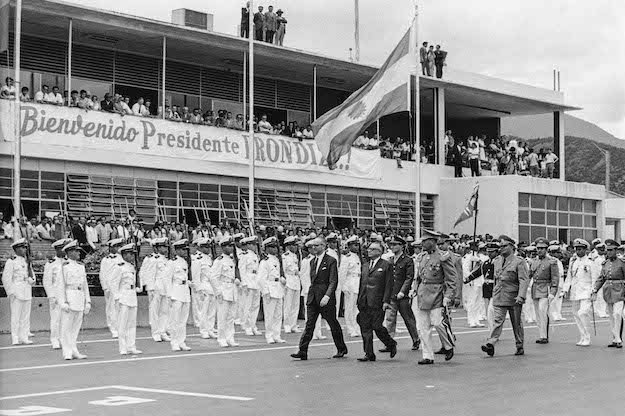This article is adapted from AQ‘s special report on migration
In 1958, the Dominican politician, writer and future president Juan Bosch desperately needed a place to find refuge. He had been arrested for a second time by the Cuban dictator Fulgencio Batista for his political activities against the Dominican dictatorship. But after a few months, under pressure from a network of Latin American intellectuals, the ailing regime in Cuba agreed to let Bosch go.
At the time, Caracas was the ideal destination — for Bosch and many other Latin Americans fleeing authoritarian rule.
Venezuela was in the midst of a democratic spring. The dictator Marcos Pérez Jiménez had been overthrown earlier in 1958, and interim president Wolfgang Larrazábal had called free and fair elections. The former president Rómulo Betancourt, the leader of the Acción Democrática party, would win the ballot with a promise of swiftly consolidating democracy.
Caracas had such an intellectually rich environment that the Central University of Venezuela immediately offered Bosch a contract to hold a series of talks, later made into a famous book — Apuntes sobre el arte de escribir cuentos (Notes on the Art of Writing Tales). Among his students was a Colombian journalist who worked as a magazine editor: Gabriel García Márquez.
The story of the encounter between García Márquez and Bosch, who in 1963 became the Dominican Republic’s first democratically elected president, would turn into a sort of Venezuelan legend, repeated over and over since. It shows how, starting in the late 1950s, Venezuela — particularly Caracas — became a refuge based on two pillars: a robust democracy and petrodollars, which meant free speech and well-paid jobs.
Today, Venezuela is at the other extreme, with no democracy and an economic meltdown, expelling millions of its citizens to countries in Latin America and beyond. The Caracas of the golden years seems like a different planet. However, its lessons are more important than ever.
Democracies, unite!
The democratic regime inaugurated by Betancourt had powerful enemies from the start. On one side, the hard left believed that only a Cuban-style revolution could bring freedom and development for the people of Latin America. The socialist Bolivian activist Marcelo Quiroga Santa Cruz pejoratively referred to the “Caracas Club” — a group of reformist leaders including Betancourt, Argentina’s Arturo Frondizi and Peru’s Víctor Raúl Haya de la Torre. A democracy that tried to combine free market rules with social justice, including through policies such as land reform, was too bourgeois.
Meanwhile, right-wing forces saw democracy as the first step toward anarchy and a communist takeover. Dictatorships — preferably under military control — could guarantee an orderly and gradual modernization aligned with traditional values.
Against his authoritarian antagonists, Betancourt proposed a foreign policy to unite democrats using one clear formula: severing diplomatic ties with any government that did not have democratic origins. According to the Betancourt Doctrine, regimes that came to power through violence were illegitimate and Venezuela should recognize them as such, breaking relations.
Betancourt understood well the difficulties of maintaining a democracy in a region full of authoritarian regimes, particularly because several of these dictatorships had been actively supporting one another with arms, money and more for decades. The Venezuelan president strongly believed that to preserve democracy in Venezuela, he needed to build a regional coalition of democracies as well.
Already in 1950, Betancourt had organized the Pro-Democracy and Freedom Conference in Havana, trying to unite the region’s democratic forces. By 1960, he had become the champion of the democratic cause, while his nemesis was the Dominican dictator Rafael Trujillo Molina. The dispute between the two rapidly translated into violence, with Trujillo ordering a bomb attack that almost killed Betancourt in June 1960.
Dominican dissidents assassinated Trujillo the following year. However, by then the biggest threat to Betancourt was no longer right-wing regimes, but leftist guerrillas. Predicating a continental revolution, Fidel Castro began to supply Venezuelan groups with weapons, money and training to overthrow the government in Caracas. The John F. Kennedy administration fully supported Venezuela against Havana. But the Cold War polarization undermined the Betancourt Doctrine, since the specter of communism was becoming an excuse for coups against democratically elected presidents.


The end of the line
The 1960s was a turbulent decade in Latin America: the 1962 coup against Frondizi in Argentina, the 1964 destruction of Brazilian democracy, and the 1965 U.S. intervention in the Dominican Republic, among other episodes, muddied the waters for Betancourt’s pro-democracy foreign policy. It became increasingly challenging for Venezuela to condemn authoritarian governments that were backed by the West and shared Caracas’ opposition to Castro.
This contradiction led President Rafael Caldera to switch the Betancourt Doctrine to a realpolitik approach to diplomacy in the 1970s. Rhetorical support for democracy was maintained, but without breaking commercial and diplomatic relations with non-democratic governments.
The realignment did not affect Caracas’ status as a haven for dissidents — and they were many. Decades before becoming president of Brazil, sociologist Fernando Henrique Cardoso was a professor at the Central University of Venezuela. El Salvador’s José Napoleón Duarte, who would also later win the presidency in his country, worked at a state-owned public works company. Renowned Cuban economist Felipe Pazos became an official at the Venezuelan Central Bank. Intellectuals like Brazil’s Darcy Ribeiro, Uruguay’s Ángel Rama, Argentina’s Tomás Eloy Martínez and Chile’s Isabel Allende did much of their best work while living in Caracas.
Even after the weakening of the Betancourt Doctrine, Venezuela remained a critical force for stability and democracy in the 1970s and 1980s. For instance, Caracas helped restore the Panama Canal to the Panamanian government and — arguably its most important achievement — worked as a peace broker in the Central American civil wars, under the Contadora Group.
Six decades later, with the crisis in his home country Venezuela, Betancourt’s message has gained a tragic timeliness. It is a call for collective action: most Latin American countries understand that the destruction of a democracy in the region will always be a threat to all Latin American democracies. But it is also a matter of conscience: Venezuela has done so much for Latin American dissidents in the past that several countries feel they have a moral duty to Venezuelans now fighting for democracy.
—
Straka is a history professor at Andrés Bello University in Caracas








